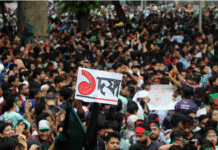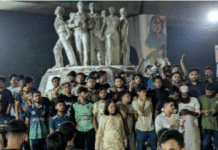
As of September 21, political activities by students and/or teachers and staff have been declared to be “banned” in at least 33 higher education institutions in Bangladesh—19 public universities, four government colleges, and 10 government medical colleges. It is reported that many students themselves have demanded this ban, though others think the ban is ill-judged and participation in “healthy politics” by students is essential.
How not to fall back into the pattern of partisan control of campuses by agents of political parties that have destroyed the academic culture for years, and how to usher in a peaceful environment for intellectual and academic pursuits and practising democratic values are the critical questions today. A ban on campus politics seems to be an easy answer. But what does it mean and how will it work?
A survey carried out by the Dhaka University Research Society (DURS), a voluntary body of student and faculty researchers, revealed that 83.8 percent of the students who participated in the survey opted for a total ban on campus politics. Another 16 percent wanted “reformed” student politics on campus, allowing activities with control. The survey was conducted between September 3 and 11 on 2,237 currently enrolled students.
The University Reform Initiative (URI), a platform of Dhaka University students that included some coordinators of the anti-discrimination student movement, put forward an eight-point proposal for reform during a press briefing on September 7. They demanded prohibition of all forms of partisan politics in residential and academic areas on the Dhaka University campus and enabling all candidates to run independently in the DUCSU or hall union elections. Another point is about not preventing individual students from expressing political views, but prohibiting collective political activities of any form, even forming panels or presenting a collective manifesto for university and hall student body elections. This is a meaningless oxymoron, because politics in any form is a collective action.
Meanwhile the University Teachers’ Network, a voluntary body of university teachers which supported the student protest, put forward a proposal for university reforms. During a discussion at Dhaka University on August 19, they called for “modern universities that support freedom of thought and encourage students to ask questions.” They want teachers to be held accountable for classroom performance and decentralisation of decision-making from the current concentration of all kinds of decisions with the vice-chancellor.
A group of teachers under the banner of Dhaka University Teachers’ Society (DUTS) in a 15-point proposal presented to the University Grants Commission (UGC) on September 15 called for change in university appointments process, research collaboration between public and private universities, and a uniform student admission system for higher education. Both the teachers’ bodies would like to see an overhaul of the selection process for the heads of universities and other top positions, shunning partisan political loyalty as the main criterion for appointments.
It can be said that both students and teachers are trying hard to navigate a treacherous path, trying to ensure that one set of hegemonic powerholders is not replaced by another set when a political regime returns. The task is made difficult and complex by decades of partisan control of academia by all stripes of regimes that have held power since the birth of Bangladesh.
The sight is often being lost that students’ and teachers’ participation in politics is not the problem; the problem is violence, extortion, criminality, breaking the rules and regulations of the institution, and tolerance and even encouragement of such by the state authorities and the university administration. In one form or another, ruling parties in Bangladesh have maintained the mindset and habits of the military rulers of Pakistan (some may remember the days of General Ayub Khan and Governor Abdul Monem Khan) who wanted to control academia by creating their own agents among students and teachers.
Ironically, since the restoration of democracy in 1991 following another public uprising, the ruling parties went one step further by abandoning student union elections at universities, considering these as a spoiler for their plan to control the academia. One foray into student union election in Dhaka University under court orders was sabotaged via election-rigging by the university authorities. The university then did not cooperate with the elected union because the head of the body (vice-president), elected despite the rigging efforts, was not to the regime’s liking. Student union elections were not heard of since then in Dhaka University or any other institution.
The task of restoring academia’s integrity can be simple and achievable if the political decision-makers do not harbour the goal of controlling academia in order to maintain their grip on political power at any cost. We can assume the interim government has no such aim, and therefore it has the opportunity and the responsibility to take the right steps. But how can it be guaranteed that the political class waiting impatiently in the wings to return to power will not fall back to their old habits?
The interim government should consider three major enabling steps both as urgent actions and for laying the ground for change in mindsets and practices in academia:
i) Make it clear that higher education administrators are required only to serve academic interests of the students and institutions, and not the partisan and narrow interests of the ruling regime; that their performance would be judged by these criteria; and that all support of the state would be given to do their job.
ii) Initiate a process of formulating a code of conduct for students and teachers and staff of higher education institutions—universities, colleges and professional institutions—that would create the conditions for students and teachers/staff behaving responsibly to achieve the common goals of the institutions. The UGC may take the lead in preparing the principles and models for the codes, which can be adapted for each type of institutions. This is not likely to be a quick process. But this exercise can also begin in each institution involving students, teachers, parents and other stakeholders. Institutions can make early decisions where there is a consensus on certain points, and other solutions can evolve and be adapted gradually in the light of the national discourse.
iii) Student body elections should be held soon in each institution of higher education to allow students to participate and contribute to the academic and co-curricular management of institutions, promoting student well-being and helping create the conditions for pursuing academic, creative and democratic values as students.
Coming back to how the political parties can be held accountable for nurturing and protecting the education system and the academia, it is a question of political parties themselves being self-reflective and engaging in their own reforms, vowing to abandon the old habits. Public representation rules requiring parties not to create their own agents among students and teachers that undermines the academic purposes of institutions would be necessary. Ultimately, the academic community has to remain united and vigilant to protect its integrity and freedom.
Dr Manzoor Ahmed is professor emeritus at BRAC University, chair of Bangladesh ECD Network (BEN), and adviser to the Campaign for Popular Education (CAMPE).
Daily Star









